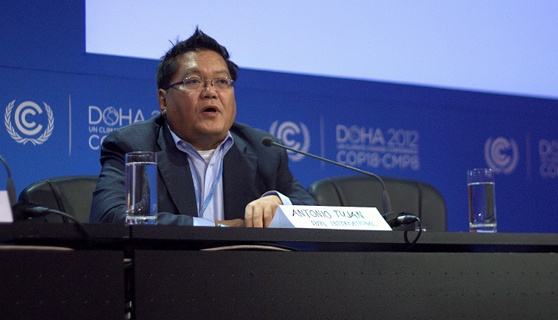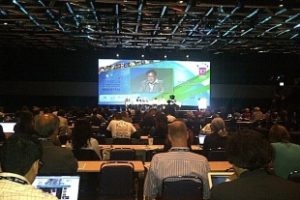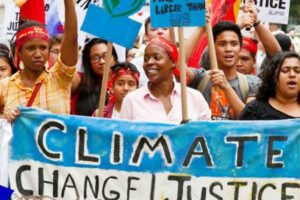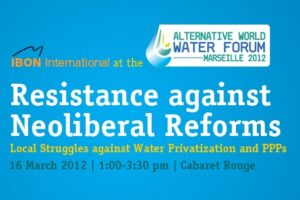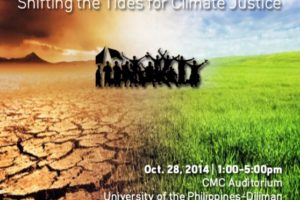IBON International Outlook
By ANTONIO TUJAN JR., IBON International
[[{“type”:”media”,”view_mode”:”media_large”,”fid”:”45″,”attributes”:{“alt”:””,”class”:”media-image”,”height”:”178″,”style”:”width: 310px; height: 178px; margin: 10px; float: right;”,”typeof”:”foaf:Image”,”width”:”310″}}]]
DOHA, December 4, 2012—When the ministers of the developed world arrive in Doha for the beginning of high-level negotiations on climate change today – Tuesday – they must remember one of the founding principles of the United Nations Framework Convention on Climate Change (UNFCCC). Article 3.1 reads: “The developed country Parties should take the lead in combating climate change and the adverse effects thereof.
Negotiations at the 18th Conference of Parties (COP18) to the UNFCCC have stalled in the past week and are in danger of falling into complete paralysis. Developed and developing countries are facing off over issues central to the UNFCCC, new targets for emissions reductions in an extended Kyoto Protocol, and climate finance for developing countries to transition to sustainable development.
On one side of the divide, the developing countries are pushing for the developed to adhere to the measures they know to be necessary to keep the world beneath an agreed 2°C temperature rise. With agreements left as they were before negotiations, the World Bank has warned of a 3°C rise, and with an increasingly likely regression on agreements a catastrophic 4°C rise. As the ones who will bear the burden of a catastrophe made in the developed world, developing countries are urging for concrete commitments to back up the promised billions of dollars in climate finance, both over the next seven years as well as the targeted 2020 start-up date of the Green Climate Fund. On the other side, the developed nations do what they can do to stall negotiations and obstruct progress through focusing on the minutiae of a deal that threatens to be derailed with devastating consequences for the world’s poorest.
At the heart of the UNFCCC’s mantra of equity and call for developed country leadership is historical responsibility. The climate change we see now, which has caused droughts, floods, displacement, and loss of lives and livelihoods to those in the Global South, arises from CO2 that has spewed into the atmosphere over the past 160 years. Together, the US and EU account for more than half of the world’s CO2 emissions in this period. In line with this, it is they who must take on the bulk of the burden of historical responsibility for climate change and show leadership to other developed nations.
COP18 is in desperate need of a developed world power to lead the way, to turn rhetoric into reality.
At present the second commitment period of the Kyoto Protocol, the treaty that is the cornerstone of emissions reductions, lies in tatters. Of the industrialized countries, only the EU and Australia remain. The EU has shrunk away from greater carbon emissions targets on the basis that if it went alone the cost would be too high. Australia is one of the world’s highest per capita emitters, and part of the “Umbrella Group” of countries (also including New Zealand, Russia, the Ukraine, Kazakhstan, Norway, and Japan) that does much to block progress on commitments. Its signing up to an ambitious target is “conditional on international action”.
After winning election on the back of a campaign devoid of any mention of climate change, in his first press conference Barack Obama spoke of a “responsibility” to tackle carbon emissions associated with climate change. Soon after, the US chief negotiator at COP18 Jonathan Pershing spoke of the US’ “enormous” efforts on climate change. But in an off-the-record meeting in Doha, Pershing said that US positions are not based on “what is needed”. Instead he said: "If we can't take it home and sell it at home, in whatever political economy we are living in, we won't do it." Among Pershing’s comments was the insight that a 37 percent reduction on 1990 emission levels for the US, paralleled by a small reduction in emissions for China and space for growth for India, does not “work” politically and cannot be “sold” to the US Congress.
IBON International has calculated how much the world’s biggest historical emitters must reduce CO2 emissions by if the world is to stand a decent chance of reaching a 2°C temperature rise target while sharing atmospheric space equally among the world’s populations by 2050. By dividing the total emissions permitted for 2°C climate change in 2050 by total projected world population, and then using that as a convergence point from 1990 emissions levels, the US must reduce per capita emissions by at least 94 percent on 1990 levels, Germany by 90 percent, the UK by 88 percent, Italy 85 percent, and France 83 percent. By comparison, China must reduce per capita emissions by at least 47 percent.
Based on the “polluter pays principle”, the US and EU must also take leadership in providing climate finance since they have the greatest share of cumulative CO2 emissions. Our calculations show the US and EU must capitalize the Green Climate Fund with USD39 billion and USD35 billion respectively. On the other hand, developing countries—including China, with a GDP per capita level nine times lower than the US—make no contribution and are expected to prioritize battling domestic poverty and the adverse impacts of climate change.
There were hopes in the run-up to COP18 that the onslaught of Hurricane Sandy would help shift US public opinion for the benefit of the poorest in the world who suffer the impacts of climate change every day. Some 131 US citizens died in Sandy, which was linked to the impacts of climate change on sea surface temperatures.
Historic carbon emissions from the US equal those of Russia, China, Germany and the UK combined. The cumulative emissions of Africa are hardly worth counting, and today make up only 4 percent of the world total. Yet drought in the Horn of Africa this year and last year, one of many events linked to climate change in the Global South, killed tens of thousands and left more than 12 million people in urgent need of food.
The US often projects a self-ascribed role of acting for the benefit of others in the world. At COP18 it, along with the EU, must move beyond a concern for its interests alone, and live up to its obligation to act for the other people inhabiting this planet.
The world’s richest have both the responsibility and power to breath life into a process they have done much to stall – at the expense of the world’s poorest. If they do not, then the cost, which will be measured in human lives, will be on their shoulders. ###
